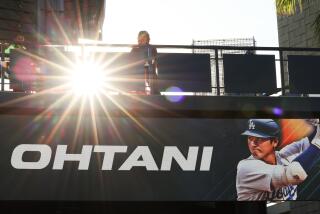‘Dark Knight Rises’ creates tension between Warner Bros. and Legendary Pictures
- Share via
Warner Bros. and Legendary Pictures are arguably Hollywood’s highest-profile business partners, having shared in the spoils of such blockbusters as “300” and “The Hangover” and the pain of flops like “Jonah Hex” and “Sucker Punch” over the last six years.
But the future of their partnership has come into question as the companies have for the last few months been discussing the possibility of extending their co-financing and production deal, which expires in 2013. That’s in part because the sides have also been in heated negotiations over how they will work together on one of the industry’s most highly anticipated movies, next summer’s Batman sequel, “The Dark Knight Rises,” according to knowledgeable people who declined to be identified because the talks are confidential.
While Legendary was a 50-50 partner on 2008’s “The Dark Knight,” which grossed more than $1 billion worldwide and sold 16 million DVDs, the film financing and production company has for months been trying to secure a similar ownership stake in the sequel. The film, which like the last two Batman pictures will be directed by Christopher Nolan and star Christian Bale, is expected to cost at least $250 million to produce.
Warner Bros.’ recently installed movie chief Jeff Robinov has been resistant to again share half the profits, people close to the talks said. A major reason is the studio’s impending loss of its most lucrative wholly owned movie franchise, “Harry Potter,” which ends its run this summer. Robinov is counting on DC Comics superheroes to fill the void left by the boy wizard.
Robinov and Legendary Chairman Thomas Tull recently agreed to collaborate on “The Dark Knight Rises” but are still discussing the terms of their financial arrangement — most notably whether Legendary will get less than a 50% stake this go-around.
“Legendary has been a great partner, and we look forward to working with them on ‘The Dark Knight Rises,’” Robinov said.
Tull declined to be interviewed for this story. Some who know the two said Tull and Robinov do not enjoy the same close relationship that the Legendary founder did with former Warner Bros. President Alan Horn, who left his post as the studio’s top film executive in March. But Robinov insists the two have a good relationship.
The negotiations have butted up against this month’s start of production of “The Dark Knight Rises,” whereas the two companies usually begin working together earlier in the development process.
Beyond the financial benefits, owning a piece of “The Dark Knight Rises” is important to Tull because he has in large part shaped his and his company’s public image around “fanboy” films like “Batman Begins,” “Watchmen” and the surprise hit “300.”
As discussions over extending their overall partnership continue, Warner and Legendary are working on a number of upcoming projects, including “Superman: The Man of Steel” and sequels to “The Hangover” and “Clash of the Titans.”
If Legendary had been shut out of the caped crusader’s latest swing on the big screen, it would have undoubtedly put a dent in their relationship.
Since Legendary signed on in 2005 as one of Warner’s two primary financing partners (along with Village Roadshow Pictures), the company has evolved into a much more powerful force within Hollywood. Over the last year, Tull has bought out Legendary’s original investors, giving him more control over strategic decisions, and is in the process of raising a new $700-million credit facility with lead bank JPMorgan Chase & Co. that would run until 2016 — three years after the current Warner deal expires.
Legendary recently launched television and comic book production divisions and is investing in developing more of its own film projects, including director Guillermo del Toro’s planned science fiction event film, “Pacific Rim.”
The moves make Legendary a potentially more valuable partner in an age in which studios want to minimize their risk as they make an ever-increasing number of big-event pictures that typically cost more than $350 million to make, market and distribute around the globe.
“Having reliable financing partners you can consistently call on is critical for anyone running a studio and putting together a slate of films these days,” said producer Brad Weston, a former president of production at Paramount Pictures.
ben.fritz@latimes
More to Read
Inside the business of entertainment
The Wide Shot brings you news, analysis and insights on everything from streaming wars to production — and what it all means for the future.
You may occasionally receive promotional content from the Los Angeles Times.










